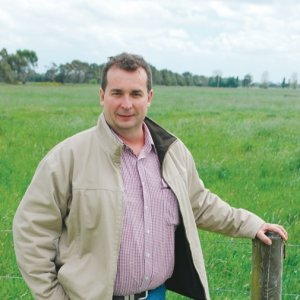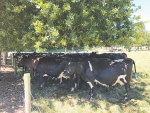‘CRANKY COW’ syndrome is a growing problem often overlooked by Australian dairy farmers, said a speaker at a field day in south-west Victoria.
Cows get temperamental, give less milk and development ailments including heat stress and staggers. It is caused by toxins produced by rye grass endophyte.
The topic arose at a `More Milk, Less Stress’ field day on October 25 at Ecklin, near Terang. The organiser, Farmgate Stockfeeds, aims to help dairy farmers lift milk output and cope better in tough times. Farmers also heard about how to deal with stress.
Ruminant nutritionist Damian Moore, director of feed safety with Meriden Animal Health, told the field day ‘cranky cow’ syndrome is more of a problem than most farmers realise.
“They often blame the weather, dogs and all sorts of things for cows are playing up, but the problem is caused by these toxins produced by the endophytes in their pasture,” Moore said.
“Most farmers don’t realise the cause because the toxins have been in the pastures for so long and so have the effects.”
The toxins cause staggers, heat stress, lower feed intake, reduced milk production and general irritability.
“Affected cows will be tempera-mental and tend to strike out, kick the cups off and be frightened easily,” Moore said.
Endophytes are particularly prevalent in perennial ryegrass and tall fescue and most frequently are found in older pastures.
Moore said Australia’s meat industry lost about $60 million a year in stock and production loss due to endophyte toxins.
Extreme cases in hot summers could result in multiple animal deaths, he added.
No silver bullet cure exists, though Fusion, a new microtoxin binder, work well in reducing the direct effects of perennial ryegrass toxicity.
Also at the field day, Performance Probiotics area manager Tom Newton outlined natural ways to improve herd health and performance, dairy farmer Jack Kenna told his story of running a dairy farm and business while coping with mental illness, and local health workers organised by Aspire, A Pathway to Mental Health told how to recognise and handle stressful times.


















